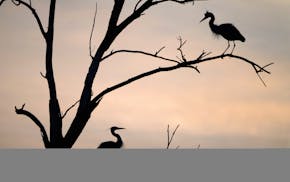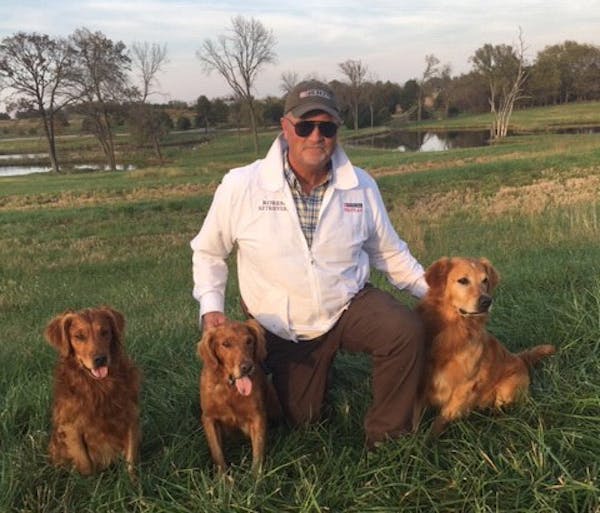IN THE BOUNDARY WATERS CANOE AREA WILDERNESS – Thursday morning the sun failed again to reveal itself. But the day was brighter than previous days and the rain generally held off. More importantly the wind had settled and Moose Lake, about 20 miles up the Fernberg Road from Ely, was alternately flat and only slightly riffled.
"We'll see you this evening,'' I said.
With a wave Bob LaTourell acknowledged as much and I stepped into one of his rental boats, started the outboard and headed up Moose Lake toward Newfound and Sucker lakes, and on to Ensign Lake.
I hadn't been into Ensign for 25 years or more, perhaps not since I lived in Ely, when both Bob, who is the third generation of his family in the outfitting business, and I were younger.
Lying a short portage off Sucker Lake, Ensign holds walleyes and smallmouth bass as well as northern pike.
My wife, Jan, was in the bow, while behind us, connected by rope, was the canoe we would portage into Ensign. It balanced neatly in the boat's wake, a scimitar on plane, and when we arrived at the portage we would cache the boat and tote the canoe and our day's gear — three fishing rods, a timeworn Duluth pack with extra clothing, a tackle satchel and our paddles — across to Ensign.
The U.S. Forest Service governs this BWCA motorboat route via permits, which are limited in number and popular among anglers. This is especially true in spring, when Basswood Lake, arguably the wilderness' showpiece, can be reached by the Moose-Newfound-Sucker chain.
Yet the hum of outboards that echoes today between these piney shorelines is a relative anachronism. Before 1950, before a floatplane ban was initiated over the boundary waters, and even before 1964, when the canoe area was recognized as a federally protected wilderness, Basswood was a motorboat-laced fishing destination as popular as Mille Lacs, and anglers traveled to the huge border water by any means available.
Old Frank Hubacheck had his place on Basswood, as did the Johnson boys with their fishing camp in Bayley Bay. Wenstrom's Basswood Beach Resort was there, too, as was Maple Leaf Lodge and a flotilla of cabin boats that housed anglers eager to catch Basswood's trophy walleyes and northern pike.
The legendary Dorothy Molter also routinely skimmed along Sucker, Newfound and Moose lakes via outboard-powered canoe while traveling to Ely for supplies from her home on Knife Lake.
But time passes, and changes come. Dorothy's well gone now from this good country, as are Hubacheck and the others. And Basswood's cabins and camps are no more.
At the entrance to Ensign, I secured the boat, threw my old canvas Duluth pack over my shoulders, also the canoe, and followed Jan across the portage.
• • •
"Go ahead and cast your lure off the left side, and I'll be on the right.''
Jan was in the bow and I the stern. Our plan was to troll crankbaits along shorelines and the edges of small rocky islands, hoping to find pockets of smallies or walleyes, then perhaps switch tactics and jig.
Greeting our entry to Ensign, a white-headed bald eagle swooped low over us, investigating. The commanding view these big birds must have while circling above, or while perched in a lob pine scanning the shallows for dinner, is a source of jealousy on my part. I could only imagine what this eagle was seeing, and thinking, peering down on us, two people in a canoe.
"I've got one.''
The tip of Jan's rod pulsed against the pull of whatever had struck her lure. Perhaps, I thought, the angling gods were smiling today. Ensign can be an excellent fishing lake. But the weather had been finicky. I hadn't expected to hook up so quickly.
"Northern,'' I said when the fish was alongside the canoe.
Any day of the week a northern pike compares favorably to a walleye as table fare. But so early in the day we didn't need to swing dinner from a stringer, and with a long-nosed pliers I shook the treble hook from the fish's mouth and watched its 25-inch form disappear into Ensign's tannin-colored depths.
So fast was the northern pike action in the following half-hour we thought we might pass the day half-paddling and half-drifting while fighting fish. Senses are heightened in a canoe anyway, and hooking and unhooking fish compounds these amplifications. That these thrill rides occur in an otherwise largely silent wilderness only adds, ultimately, to the allure and mystery of travel in canoe country, stroke by stroke.
On we paddled. I had a who's-who of crankbaits in my satchel, each with different running depths, and we tried them all. Not knowing exactly Ensign's varying water depths resulted in periodic snags, and we lost a crankbait or two. But the day was ours, and we occasionally paddled ashore to tie on new lures or stretch our legs, time passing at our whim.
Sometimes we passed campsites on the lake occupied by paddlers beaten back by the recent rains. Canoes were turned over on shore and some campsites seemed empty, their occupants hunkered in tents. Clothes were hung to dry, though they couldn't dry, and smoky campfires were telling of the wet wood being burned. Some campers waved but said nothing, or little, except that fishing had been slow and they wanted the rain to stop.
We found more northerns, and also smallmouth bass, including one monster, but my theories about where walleyes could be found proved entirely theoretical.
In shades of gray, evening overtook our return portage to Sucker Lake.
The boat was there where we left it, and I roped the canoe to it, angling us then toward Newfound Lake and beyond, to Moose Lake, the outboard's soft hum echoing between the piney shorelines.
Dennis Anderson • danderson@startribune.com
Anderson: Anglers protesting tough new Mille Lacs rules are wrong

Anderson: Courts, not politicians, should rule on Red Lake, White Earth lands

Anderson: Multimillion windfall gets invasive carp deterrent moving
![A young whitetail deer searches for food as another blanket of snow coats the arrowhead. ] Minnesota -State of Wonders, Arrowhead in Winter BRIAN PETE](https://arc.stimg.co/startribunemedia/WK32UWWY6FKNWJUIYCJ6ZPT4AU.jpg?h=91&w=145&fit=crop&bg=999&crop=faces)
Anderson: In NE Minnesota, DNR staff, habitat and deer all decline


